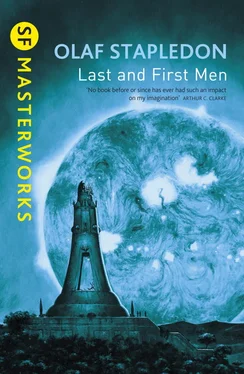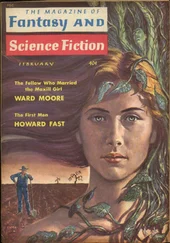Olaf Stapledon - Last and First Men
Здесь есть возможность читать онлайн «Olaf Stapledon - Last and First Men» весь текст электронной книги совершенно бесплатно (целиком полную версию без сокращений). В некоторых случаях можно слушать аудио, скачать через торрент в формате fb2 и присутствует краткое содержание. Город: London, Год выпуска: 1999, ISBN: 1999, Издательство: Orion Publishing Group, Жанр: Фантастика и фэнтези, на английском языке. Описание произведения, (предисловие) а так же отзывы посетителей доступны на портале библиотеки ЛибКат.
- Название:Last and First Men
- Автор:
- Издательство:Orion Publishing Group
- Жанр:
- Год:1999
- Город:London
- ISBN:978-1-857-98806-2
- Рейтинг книги:3 / 5. Голосов: 1
-
Избранное:Добавить в избранное
- Отзывы:
-
Ваша оценка:
- 60
- 1
- 2
- 3
- 4
- 5
Last and First Men: краткое содержание, описание и аннотация
Предлагаем к чтению аннотацию, описание, краткое содержание или предисловие (зависит от того, что написал сам автор книги «Last and First Men»). Если вы не нашли необходимую информацию о книге — напишите в комментариях, мы постараемся отыскать её.
is full of pioneering speculations about evolution, terraforming, genetic engineering and many other subjects.
Last and First Men — читать онлайн бесплатно полную книгу (весь текст) целиком
Ниже представлен текст книги, разбитый по страницам. Система сохранения места последней прочитанной страницы, позволяет с удобством читать онлайн бесплатно книгу «Last and First Men», без необходимости каждый раз заново искать на чём Вы остановились. Поставьте закладку, и сможете в любой момент перейти на страницу, на которой закончили чтение.
Интервал:
Закладка:
Thus was this once noble people singled out by the gods to be cursed, and the minister of curses.
Chapter III - AMERICA AND CHINA
1. THE RIVALS
AFTER the eclipse of Europe, the allegiance of men gradually crystallized into two great national or racial sentiments, the American and the Chinese. Little by little all other patriotisms became mere local variants of one or other of these two major loyalties. At first, indeed, there were many internecine conflicts. A detailed history of this period would describe how North America, repeating the welding process of the ancient “American Civil War,” incorporated within itself the already Americanized Latins of South America; and how Japan, once the bully of young China, was so crippled by social revolutions that she fell a prey to American Imperialism; and how this bondage turned her violently Chinese in sentiment, so that finally she freed herself by an heroic war of independence, and joined the Asiatic Confederacy, under Chinese leadership.
A full history would also tell of the vicissitudes of the League of Nations. Although never a cosmopolitan government, but an association of national governments, each concerned mainly for its own sovereignty, this great organization had gradually gained a very real prestige and authority over all its members. And in spite of its many short-comings, most of which were involved in its fundamental constitution, it was invaluable as the great concrete focusing point of the growing loyalty toward humanity. At first its existence had been precarious; and indeed it had only preserved itself by an extreme caution, amounting almost to servility toward the “great powers.” Little by little, however, it had gained moral authority to such an extent that no single power, even the mightiest, dared openly and in cold blood either to disobey the will of the League or reject the findings of the High Court. But, since human loyalty was still in the main national rather than cosmopolitan, situations were all too frequent in which a nation would lose its head, run amok, throw its pledges to the winds, and plunge into fear-inspired aggression. Such a situation had produced the Anglo-French War. At other times the nations would burst apart into two great camps, and the League would be temporarily forgotten in their disunion. This happened in the Russo-German War, which was possible only because America favoured Russia, and China favoured Germany. After the destruction of Europe, the world had for a while consisted of the League on one side and America on the other. But the League was dominated by China, and no longer stood for cosmopolitanism. This being so, those whose loyalty was genuinely human worked hard to bring America once more into the fold, and at last succeeded.
In spite of the League’s failure to prevent the “great” wars, it worked admirably in preventing all the minor conflicts which had once been a chronic disease of the race. Latterly, indeed, the world’s peace was absolutely secure, save when the League itself was almost equally divided. Unfortunately, with the rise of America and China, this kind of situation became more and more common. During the war of North and South America an attempt was made to recreate the League as a Cosmopolitan Sovereignty, controlling the pooled armaments of all nations. But, though the cosmopolitan will was strong, tribalism was stronger. The upshot was that, over the Japanese question, the League definitely split into two Leagues, each claiming to inherit universal sovereignty from the old League, but each in reality dominated by a kind of supernational sentiment, the one American, the other Chinese.
This occurred within a century after the eclipse of Europe. The second century completed the process of crystallization into two systems, political and mental. On the one hand was the wealthy and close-knit American Continental Federation, with its poor relations, South Africa, Australia, New Zealand, the bedridden remains of Western Europe, and part of the soulless body that was Russia. On the other hand were Asia and Africa. In fact the ancient distinction between East and West had now become the basis of political sentiment and organization.
Within each system there were of course real differences of culture, of which the chief was the difference between the Chinese and Indian mentalities. The Chinese were interested in appearances, in the sensory, the urbane, the practical; while the Indians inclined to seek behind appearances for some ultimate reality, of which this life, they said, was but a passing aspect. Thus the average Indian never took to heart the practical social problem in all its seriousness. The ideal of perfecting this world was never an all-absorbing interest to him; since he had been taught to believe that this world was mere shadow. There was, indeed, a time when China had mentally less in common with India than with the West, but fear of America had drawn the two great Eastern peoples together. They agreed at least in earnest hate of that strange blend of the commercial traveller, the missionary, and the barbarian conqueror, which was the American abroad.
China, owing to her relative weakness and irritation caused by the tentacles of American industry within her, was at this time more nationalistic than her rival. America. indeed, professed to have outgrown nationalism, and to stand for political and cultural world unity. But she conceived this unity as a Unity under American organization; and by culture she meant Americanism. This kind of cosmopolitanism was regarded by Asia and Africa without sympathy. In China a concerted effort had been made to purge the foreign element from her culture. Its success, however, was only superficial. Pigtails and chopsticks had once more come into vogue among the leisured, and the study of Chinese classics was once more compulsory in all schools. Yet the manner of life of the average man remained American. Not only did he use American cutlery, shoes, gramophones, domestic labour-saving devices, but also his alphabet was European, his vocabulary was permeated by American slang, his newspapers and radio were American in manner, though anti-American in politics. He saw daily in his domestic television screen every phase of American private life and every American public event. Instead of opium and joss sticks, he affected cigarettes and chewing gum.
His thought also was largely a Mongolian variant of American thought. For instance, since his was a non-metaphysical mind, but since also some kind of metaphysics is unavoidable, he accepted the naďvely materialistic metaphysics which had been popularized by the earliest Behaviourists. In this view the only reality was physical energy, and the mind was but the system of the body’s movements in response to stimulus. Behaviourism had formerly played a great part in purging the best Western minds of superstition; and indeed at one time it was the chief growing point of thought.
This early, pregnant, though extravagant, doctrine it was that had been absorbed by China. But in its native land Behaviorism had gradually been infected by the popular demand for comfortable ideas, and had finally changed into a curious kind of spiritism, according to which, though the ultimate reality was indeed physical energy, this energy was identified with the divine spirit. The most dramatic feature of American thought in this period was the merging of Behaviorism and Fundamentalism, a belated and degenerate mode of Christianity. Behaviourism itself, indeed, had been originally a kind of inverted Puritan faith, according to which intellectual salvation involved acceptance of a crude materialistic dogma, chiefly because it was repugnant to the self-righteous, and unintelligible to intellectuals of the earlier schools. The older Puritans trampled down all fleshy impulses; these newer Puritans trampled no less self-righteously upon the spiritual cravings. But in the increasingly spiritistic inclination of physics itself, Behaviorism and Fundamentalism had found a meeting place. Since the ultimate stuff of the physical universe was now said to be multitudinous and arbitrary “quanta” of the activity of “spirits,” how easy was it for the materialistic and the spiritistic to agree! At heart, indeed, they were never far apart in mood, though opposed in doctrine. The real cleavage was between the truly spiritual view on the one hand, and the spiritistic and materialistic on the other. Thus the most materialistic of Christian sects and the most doctrinaire of scientific sects were not long in finding a formula to express their unity, their denial of all those finer capacities which had emerged to be the spirit of man.
Читать дальшеИнтервал:
Закладка:
Похожие книги на «Last and First Men»
Представляем Вашему вниманию похожие книги на «Last and First Men» списком для выбора. Мы отобрали схожую по названию и смыслу литературу в надежде предоставить читателям больше вариантов отыскать новые, интересные, ещё непрочитанные произведения.
Обсуждение, отзывы о книге «Last and First Men» и просто собственные мнения читателей. Оставьте ваши комментарии, напишите, что Вы думаете о произведении, его смысле или главных героях. Укажите что конкретно понравилось, а что нет, и почему Вы так считаете.











